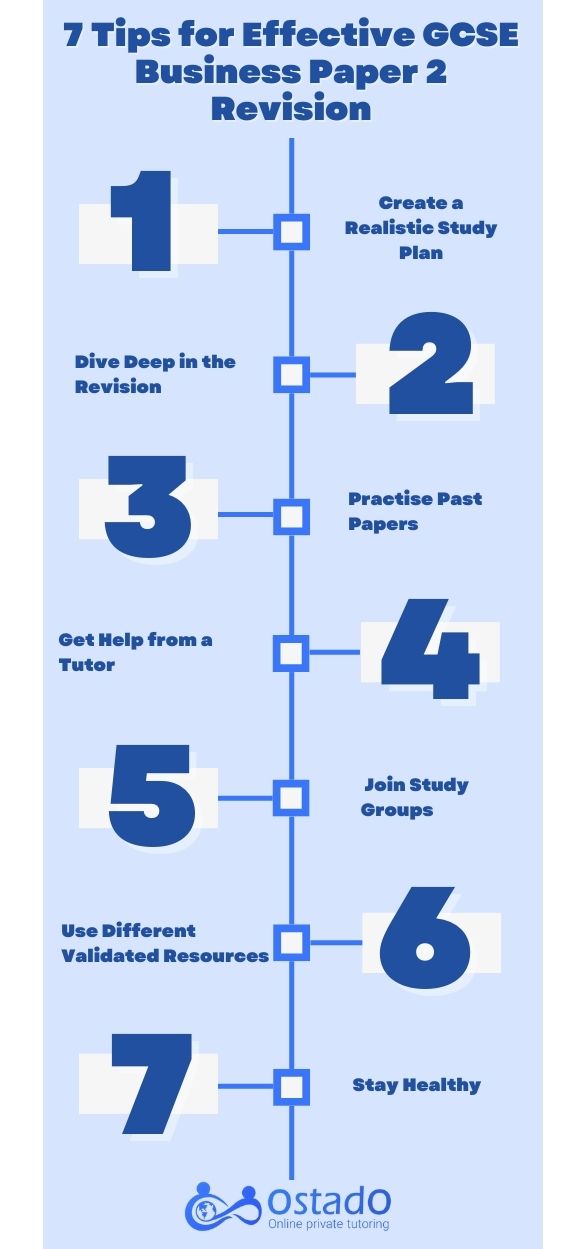Although business is a soft subject, we can’t overlook the bulk of numbers and formulas involved. You should both have a good memory and considerable problem-solving and critical thinking skills to get good results in GCSE business. But there’s nothing to worry about if you revise well for the exam, especially for paper 2, which is relatively harder than the first paper. Stay tuned to learn how to deal with GCSE business paper 2 revision.
Effective Techniques for The Best Business Revision Experience
1. Create a Realistic Study Plan
The first step is to create a revision plan. But before you take this step, think about how much time you can spend revising for GCSE Business studies.
On average, you need to spend 120 hours revising for each GCSE you want to do. So, you should start early enough to be able to manage this time. Ideally, you should start 6 or 7 months before the exam date. You can download free revision templates to organise your revision plan and check your progress.
Don’t forget to allocate enough time to regular breaks in your revision plan. There are no stone-set rules for a study and break cycle. You can continue studying until you lose focus. Or you can use the 50/10 pattern (50 minutes studying and 10 minutes break) or the Pomodoro study technique.
Read more:
If you’re looking for a structured and at the same time flexible alternative to a revision plan, you can try Retaking GCSEs Online. Although you can’t take the actual exam online, there are valuable courses you can take to prepare for the exam.
2. Dive Deep in the Revision
You should have an active part in the revision to make it more engaging. You can take notes of the topics you find more challenging or summarise all the materials topic by topic. This will make future reviews much easier. If you can’t afford the time to take notes yourself, you can use GCSE Business Studies Revision Notes available online.
You can also draw mind maps to visualise the connection between various topics. This technique is very useful for visual learners. You can also use ready-made mind maps for GCSE business.
3. Get Help from a Tutor
Revising for the GCSEs is a lot of work and coming up with a practical revision schedule requires experience. Therefore, if you want to make sure that your efforts result in maximum grades in GCSE business, you should get help from a school teacher or tutor. The best thing about having a tutor is that they can teach you the tips and tricks they learned over the years. So having a tutor gives you the edge and puts you ahead of other test-takers.
Ostado’s GCSE tutors can give you personalised guidelines and help you with complicated topics in GCSE business through simplified lessons. You can book a free session now to assess the quality of our online GCSE business tutors.
4. Practise Past Papers
Past papers are the best means of familiarising yourself with the exams and marking schemes. In order to get the most out of practising past papers, you should set a time limit and simulate the real exam conditions.
Past papers help you:
- Identify the gaps in your knowledge base.
- Develop test-taking strategies.
- Manage your time effectively.
- Boost your confidence for the real exam.
The best time to practise past papers is in the second to last month of your revision plan. So, if you’ve started 6 months before the exam season, you can start practising past papers in the fourth month. This gives you enough time to review the topics in which you did not get a good mark.
Click to download GCSE business past papers from different exam boards.
5. Join Study Groups
Joining a study group is an excellent way to stay motivated throughout your revision plan. The collaboration and a touch of friendly competition in study groups also makes the revision more engaging.
You can form a small study group yourself to keep things manageable or you can suffice as one study buddy and walk down the revision path together.
It’s best if you and other group members can meet in person, but if you’re far away, you can use Skype or Google Meet to hold your study session online. Before you create or join a study group, read these guidelines to make the most out of study groups.
6. Use Different Validated Resources
Diversifying your resources allows you to approach a topic or concept from different angles. Each source can highlight a unique aspect, and together, they can result in a deep understanding of the concept. Also, it adds variety to your revision plan, which makes it more appealing. Below, you can find revision resources tailored for different learning styles.
- GCSE Business Studies Revision Notes (text)
- 2024 Edexcel GCSE Business Paper 2 Preview (Video)
- GCSE Business Paper 2 (2022) Revision (Video)
- GCSE Business Studies Revision (Podcast)
- GCSE Business Practice Questions (PDF)
- GCSE Past Papers from Different Exam Boards (PDF)
7. Stay Healthy
Establish and maintain a healthy lifestyle; eat nutritious food and sleep 7 hours a day, especially in the last weeks leading up to the exam. A healthy lifestyle directly influences the productivity of your revision plan and your performance on the GCSE exam day.
Don’t be hard on yourself. Try to balance your study plan and your personal life. Overstudying doesn’t necessarily result in better grades. You can follow these tips for coping with exam stress to be more relaxed.

All GCSE Business Paper 2 Topics
While Paper 1 focuses on theories of factors influencing businesses, Paper 2 involves more numbers and calculations and focuses on the practical aspect of the subject. GCSE Business Paper 2 consists of:
- Production: How to spot a business opportunity and start one. How businesses create goods or services and the role of technology in production. Strategies for managing employees, including human resource decisions.
- Finance: Managing the income, expenditure, profit, loss and the overall financial performance of a business.
- Business Finance: Develop strategies for managing external influences and different sources of raising money to establish a business through ways like loans, shares, and retained profits (procurement).
- Investment and Growth: Assessing the economic climate and strategies for business expansion like diversification, franchising, and mergers.
It’s also essential to learn the key concepts, such as financial terms, marketing decisions, and operational decisions. Click to download an exhaustive list of GCSE Business Paper 2 Topics.
GCSE Business Paper 2 Format
There are minor differences between the exam formats of different GCSE exam boards. Regarding the AQA GCSE exam board, Paper 2 consists of various question types and the number of questions is not fixed.
Test takers have 1 hour and 45 minutes to answer all the questions that are divided in three sections. Questions in section A are mostly multiple-choice questions. Sections B and C involve short- and extended-answer questions. Overall, you can see an easy-to-hard flow in the exam paper. If students give correct answers to all questions, they will get 90 marks.
Let’s take a look at some sample questions from GCSE Business Paper 2.
- Multiple Choice: Which of the following is NOT a type of production method?
- a) Job production
- b) Batch production
- c) Flow production
- d) Mass customization
- Short Answer: What is the difference between profit and revenue?
- Extended Answer: A business is considering expanding overseas. Evaluate the potential benefits and risks of this decision.
- Calculation: A business has fixed costs of £50,000, variable costs of £2 per unit, and sells its product for £5 per unit. Calculate the break-even point in units.
FAQs - Business Paper 2 Revision GCSE
- Is business hard for GCSE?It depends on your interests and abilities, but it's considered a moderately difficult subject, thanks to the theories and formulas.
- What is Theme 2 in business GCSE?Theme 2 in the Edexcel business course is "Building a business," and it focuses on areas such as growing the business, conducting market research, and making decisions regarding financial, operational, and human resources matters.
- Can you resit GCSE business?If you fail GCSE business or don't achieve the desired GCSE grade, you can resit the exam next year.
- What is the best way to revise GCSE business?The best way is to create a personalised, practical, and realistic revision schedule. You should see daily, weekly, and monthly study targets and check your progress frequently. Additionally, you should choose revision strategies that match your learning style.

